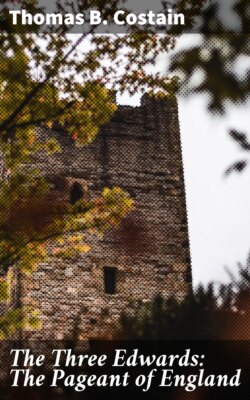Читать книгу The Three Edwards: The Pageant of England - Thomas B. Costain - Страница 10
На сайте Литреса книга снята с продажи.
The English and the Welsh 1
ОглавлениеTable of Contents
To the English, Wales had always been a troublesome neighbor. To the Welsh, England was a constant threat to their liberty.
The Welsh were what was left (with additional population pockets in Cornwall and Devonshire) of the inhabitants of the island who had fought so bravely against the Romans, the natives who were called in Rome “the black singers.” They were an imaginative race, poetic, high-strung, brave, and much given to singing and the harp. Back into their mountainous corner, their interests were limited, as were their opportunities for prosperity and abundance. They had faithful memories for the heroes of the past and they still believed that Arthur, the pendragon of glorious memory, would shake off his cerements someday and rise from the grave to lead them again to greatness.
They were in a fortunate position to carry on persistent warfare with the English. They could swoop through the passes in the hills and harry the countryside and then defy retaliation by retiring into the almost impassable land above which stood white-topped Snowdon. Although they were seldom united among themselves, the black singers could keep their wooded glens free of alien feet. This hit-and-run warfare had been going on for centuries when the Normans came over. William the Conqueror decided that something decisive must be done. He led one force into the mountains, getting as far as St. David’s, and then decided that the risks outweighed the possible gains. As a second-best measure he decided to “contain” the mountaineers. The strip of country that bordered on the Welsh foothills, and through which all invading forces going in either direction had to pass, was converted into a feudal no man’s land. The country was divided among three Norman leaders, Hugo the Wolf, William Fitz-Osborn, and Roger de Montgomery. These palatine earls were given full control of their respective counties, in return for which they were to maintain armed troops in the field and assume the responsibility of holding the Welsh in check. This system had been in effect for nearly two hundred years when Edward came to the throne, and the earls had become known as Marcher Barons. Their control of the land had become so absolute that it was said “the king’s writ did not run north of the Wye”; in other words, that they ruled in their own right and could wink at kingly powers. Political refugees were safe if they could get across the Wye.
A second move made by the resourceful Conqueror had been more successful. He had laid hands on southern Wales, which lacked the high barriers, and through the instrumentality of one Robert Fitz-Hamon had constructed a string of stone strongholds running from the Wye to the port of Milford Haven.
Edward fixed his piercing eye on Wales and he did not admire the prospect. His writ must run not only through the Marcher country but into the deepest fastnesses of the high Welsh hills. As a further stimulant, he was keenly conscious of the assistance Wales had given Simon de Montfort in the closing phases of his father’s reign. That was a score to be wiped off the slate.
He made up his mind that the problem of Wales must now be settled once and for all.
